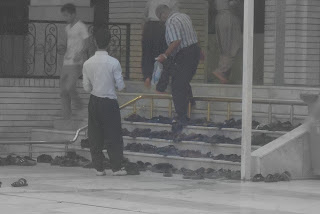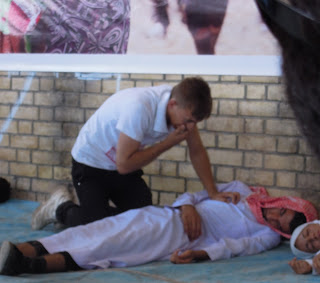"Bend it slowly, gently, give the tree time to curve, let the fibers change shape. Slowly, gently". The women followed the instructions of Diane Maytwayashing and her partner, Girard as we guided the saplings to form the skeleton of the sweat lodge. This was to be the dwelling for the sweat ceremony on the second evening of the Grassy Narrows Women's gathering held at Slant Lake blockade site on Septemeber 25-28, 2015.
The women were using ancient building techniques to create a small room. Twenty tall birch saplings had been cut and tobacco offered as an offering to give thanks to Creator and to the trees. Girard dug twelve small holes equidistant around a circle where the poles were pushed down deep. He guided us to begin bending each pole, two at a time to meet in the middle. Then the women tied strings of twine around both of the poles, creating an arch. Dianne and Girard kept reminding us," slowly, gently".
I was pleased to be invited to join in the creating, the birthing of this lodge. It was amazing to see how a tall tree could be encouraged with firm pressure to bend without breaking. I lifted my hand to help a woman with the last arch. I thought that I was being gentle and slow but shortly after I touched the tree there was a crack. The last pole was ruined. I did not receive a reprimand but maybe there was a bit of a silent sigh. The women would need to go out again to find another tree of the same size, use an axe to strip off the branches and then try again to finish the whole sweat lodge before supper.
(Photo by Torrii Cress)
The invitation for the Women's Gathering had stated,"All nations are welcome at the gathering. ". It happened that a CPT delegation had been planned for that exact weekend so we joined approximately 40 other people at Slant Lake, ten minutes from the community of Grassy Narrows. The women spent several hours of the day inside a very large wigwam that had been built with somewhat the same building techniques as the sweat lodge. The men stayed outside, chopping firewood and vegetables and minding the little ones as they wandered in and out of the meeting space.
At the first sharing circle our good friend Judy da Silva stated the guidelines of child care for the weekend. "This is a safe place for our little ones. So we will only stop them if they are in danger of hurting themselves or others. Everyone watch out for them."
It was thrilling to watch the children have control of the activities they wanted to do. The older ones had a turn at chopping wood and building fires. The little ones slept when they were tired and were laid down on a blanket within the circle, to wake up when they were ready. One little girl took the smudging medicines around and offered everyone another chance for cleansing. She imitated the drummers by taking the drum close to the fire to warm it. Her Kookum (grandmother) stood behind her and verbally helped her to be safe. "If you are feeling warm, so is the drum. It is time to move back a little so the drum does not get too hot." There was no yelling or spanking or harsh reprimands, just guidance. It seemed the rule was "gently, slowly, give the little ones time to grow , to change, to learn".
Before the delegation joined the gathering I had told them that the activities of the weekend were really a mystery to me. We talked about sitting and watching and listening and learning. If we had questions about what was appropriate for us we could talk to our partners who are very well acquainted with CPT delegates. We were given an equal place in the the sharing circle. Our turn to speak was listened to intently by all the women. We heard what all the women had to say: the very difficult in-depth stories of hardship and grief, and the joyful stories of gratefulness for healing
On the last day, at the last circle, our leader gave words of wisdom to many in the circle. As she looked at the four of us who had come via CPT she told of her gratitude for us. She also gave the reminder to us to speak up and to act when we observe oppression. "Take your learning home with you but also learn your own faith well". Over the three days we too were gently, slowly transformed. Gently, slowly, gradually curved, gradually changed..






















































